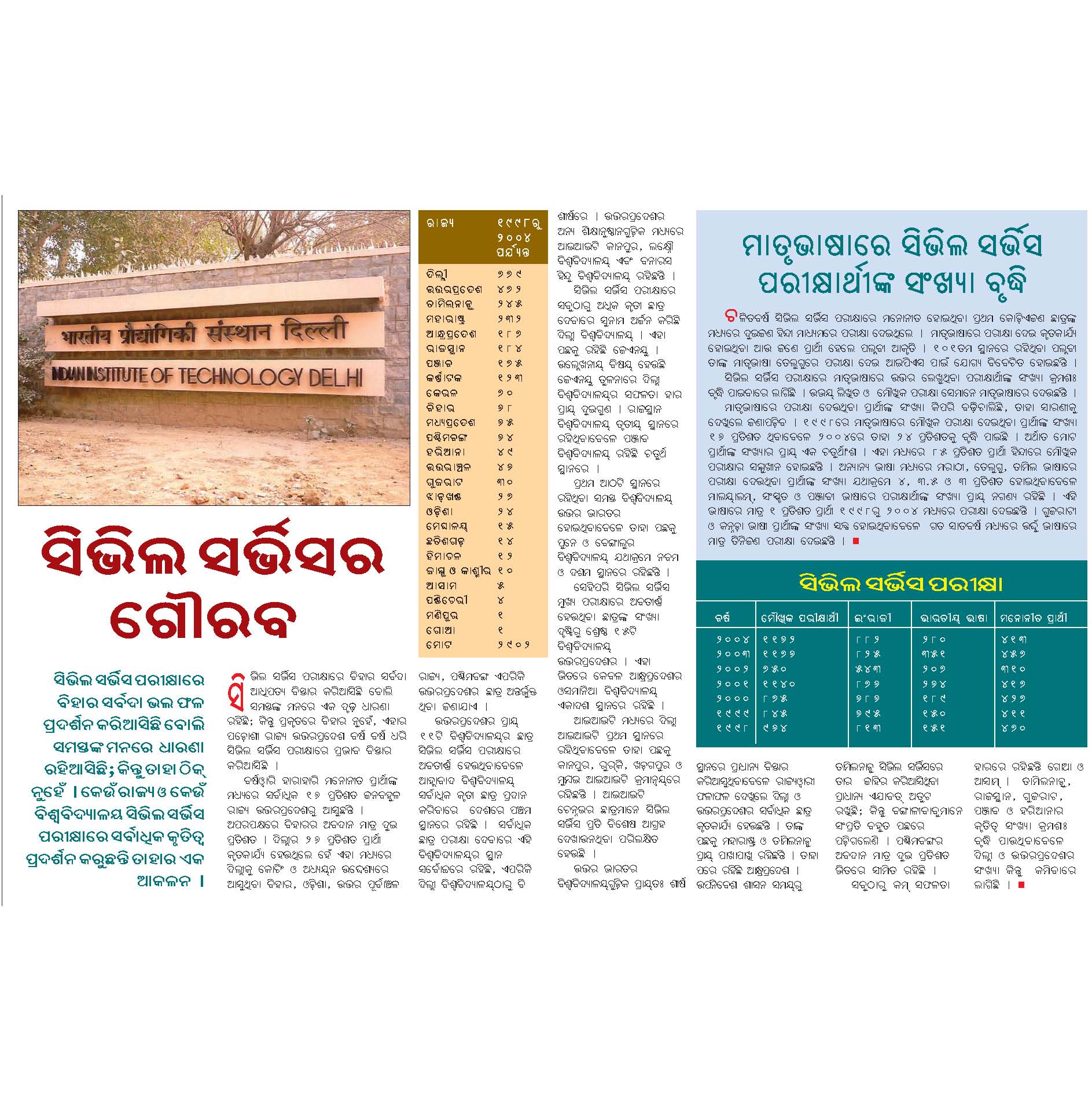Business Standard reports that central minister Chandrasekhar Sahu is pursuing with the central government regarding establishing three marquee institutions in South Orissa. Following is an excerpt of that:
While the first Central University is likely to be set up in Koraput, plans for an Indian Institute of Information Technology (IIIT) and National Institute of Design (NID) in Berhampur are in the works. …
Sahu also said he has discussed the possibility of a National Institute of Design (NID) and National Institute of Fashion Technology (NIFT) being set up in Berhampur and Bhubaneswar. The recent discussions with the Union minister for commerce, Kamal Nath, and the minister for textiles, Shankarsingh Veghela, “were very positive and they assured us that they are willing to establish these institutes if the state government extended its cooperation,†said Sahu. …
While the Central University and IIIT are under the Ministry of Human Resources Development, the NID is under the Ministry of Commerce. NIFT and NIHT come under the Ministry of Textiles.
Lets analyze this. First of all if all these materializes then its great. However lets compare what Orissa will be getting vis-a-vis the other states.
- In the Central University front, the central university in Koraput should be a distributed kind like the proposed Indira Gandhi National Tribal University. It should be designed such that it has branches in all KBK+ districts from the start.
- The tribal population percentage of the KBK districts are as follows: 8 KBK districts total 38.72% (+ 16.63 % SC). Malkangiri 58.36% (+19.96% SC), Rayagada 56.04% (+14.28% SC), Nabarangpur 55.27% (+15.09% SC), Koraput 50.67% (+13.41% SC), Nuapada 35.95% (+13.09% SC), Kalahandi 28.88% (+17.01% SC), Sonepur 22.11% (+9.5% SC), Balangir 22.06% (+15.39% SC). Two adjacent districts also have high tribal population. They are Kandhamala 51.51% (+18.21% SC) and Gajapati 47.88% (+8.77% SC).
- The literacy rates in the KBK districts are as follows: Overall in 8 KBK districts 36.58% with the female literacy at 24.72%. Malkangiri 31.26%, Nabarangpur 34.26%, Rayagada 35.61%, Koraput 36.2%, Nuapada 42.29%, Kalahandi 46.2%, Balangir 54.93%, Sonepur 64.07%. Two adjacent districts also have low literacy: Gajapati 41.73% and Kandhamala 52.95%. The state average is 63.1%.
- India already has 20 central universities and if 30 more are going to be made then besides the central university in Koraput one of the other universities in Orissa should also be upgraded to a central university.
- There will be 19 new IIITs. Orissa will be getting one of them. This is good but does not take Orissa out of the bottom of MHRD spending
- NID is good. But it does not replace the IIT that was taken away from Orissa. The 2007-08 budget for the 7 IITs is a total of 1553.70 cores (i.e., an average of 221.96 crores) while the 2007-08 budget for NID is 20.25 crores.
- Hence, Orissa must: (a) continue to push for an IIT in Orissa; (b) push for the Central University in Koraput to have branches in the KBK+ districts from the very beginning; (c) this central university should have special quote for tribals and locals as is the case in many north eastern states and as will be the case in the Indira Gandhi national tribal university; (d) push for one of the other universities in Orissa to be upgraded to a central university; (e) Make sure branches of the Indira Gandhi National Tribal University exist in the north western districts with high tribal population, in particular Mayurbhanj (tribal percentage 57.87%, literacy 52.43%), Sundergarh (50.74%, 65.22%), and Keonjhar (44.52%, 59.75%); and possibly in Sambalpur (35.08% , literacy 67.01%), Deogarh (33.31%, literacy 60.78%), and Jharsuguda (31.88% , literacy 71.47%).
June 25th, 2007
Following is an article from Samaja. It shows that among all major states of India Orissa is last but one (Chhatisgarh is last; but it has less population than Orissa) in terms of its universities sending students to civil services. Its likely that many students from Orissa go to Delhi and UP (BHU and U of Allahabad particularly) and succeed in the civil service exam from there. Nevertheless, the data shows how bad the Orissa universities have become. Urgent interventions are necessary to arrest this decline.

June 24th, 2007
Behind the scene actions are going on to start M.Tech classes at IIIT Bhubaneswar in the coming year. A director has been identified and he should be getting the formal appointment in a couple of weeks. Formal AICTE approvael for the M.Tech classes is also expected soon. As soon as that is received the advertisement for admission to M.Tech (60 seats) will come out.
June 23rd, 2007
In the last 100 years, we have had only one Indian Institute of Science at Bangalore. In past two years, we have sanctioned six more.
By six more he probably means: IISER Kolkata, IISER Pune, IISER Mohali, IISER Trivendram, IISER Bhopal, NISER Bhubaneswar.
We have opened new national institutes in medical sciences, engineering and management.
Here he means the 6 AIIMS branch campuses, the 3 new IITs, and new IIMs (so far only one IIM in Andhra has been announced.)
Today, I am happy to announce that we intend to establish 30 new Central Universities across the country. The work on the modalities for setting these up has begun and the Ministry of Human resource Development, the University Grants Commission and the Planning Commission are working to operationalize this in the next 2-3 months.
It is not clear if all these 30 new central universities will be brand new started from scratch or upgraded ones. Earlier he had said that the country currently has 20 central universities with 16 states not having any. Will these 30 new ones include the new ones announced for the north eastern states (Manipur, Tripura, Sikkim, Arunachal Pradesh). Will some favorite states, ruled by UPA allies or from where powerful UPA ministers come from get multiple new ones? Will states that already have multiple central universities get more?
I recognize that education is an important responsibility of State Governments and most educational activity is managed at the state level. That’s the reality. States and local Governments must also do more to expand access to remote areas and to the marginalized groups of society. As I had said earlier, 340 districts in our country have extremely low college enrolments. The Central Government would work with the states to support the expansion of colleges to these 340 districts. Each of these districts should strive to have at least one good college and the Central Government is considering ways of funding their establishment.
I wonder which are those 340 districts and how many are in Orissa. The Orissa government should immediate work on the list of districts and the colleges there in.
Access to higher education has two dimensions of which expansion of supply is only one. If the latent demand for higher education is to be converted to a real one, we need to consider ways of improving the financial resources of aspiring students as well. While our Government has taken several steps to expand the scholarships available to students, including students from SCs, STs and minorities, we need a much larger national programme so that no one who wants to pursue further education is denied the opportunity for lack of resources. … We are working on a national system of scholarships and easily available loans so that all needy and deserving students have access to the necessary finances to fund their higher education. We will realize this goal I hope in the coming year.
If the University system expands, it also needs a larger pool of school leavers. We are working on a plan to gradually universalize secondary schooling in our country. This programme will build on the success of the Sarva Shiksha Abhiyan and will cover the entire country in 2-3 years. Further, in order to promote excellence, we are working on a programme for having one high quality school in every block of our country. These publicly funded nearly 6000 schools all over India will establish benchmarks for excellence in public schooling which can then be the role models for the rest of the public educational system.
These are all great initiatives.
June 23rd, 2007
30 NEW CENTRAL UNIVERSITIES TO BE ESTABLISHED
EXPANSION OF COLLEGES TO 340 DISTRICTS WITH LOW COLLEGE ENROLMENT
6000 PUBLICLY FUNDED HIGH QUALITY SCHOOLS IN EVERY BLOCK OF THE COUNTRY
Continue Reading June 23rd, 2007
Pragativadi reports that the central government has sent a proposal asking which university in the state it wants to be recommended as a central university. Following are some excerpts from that report.
The Centre has yet again proposed the state government to identify one of the universities of the state to be accorded with Central University status.
A letter from the Union HRD ministry to the state government has assured that the Centre would provide cent percent financial assistance for converting any one of the state universities into a Central University. …
Meanwhile, the state higher education department, that has received the recent letter from the HRD ministry, is reviewing its consideration it had taken earlier. Sources in the official circles however, said that the state government is in a fix to recommend the name of the university to obtain central varsity status.
My initial take on this is that the state government pick one of its current university, but say in the letter that in view of the necessity of a central university in KBK, the picked university will have to have branch campuses across KBK and thus will need adequate funding for that. The long term goal then would be to convert the KBK branch campuses to a separate central university at an appropriate time in the future.
June 21st, 2007
Update: The IIT JEE 2008 counseling brochure is at http://www.jee.iitb.ac.in/CBrochure.pdf.
The 2007 IIT JEE Counseling brochure is available at http://www.jee.iitb.ac.in/2007/CBJEE_2007.pdf. Using it one can get a rough idea of ones chances based on their JEE rank. I wish and hope BPUT will create such a counseling brochure for Orissa JEE with prior year’s information.
June 20th, 2007
As per a report in Times of India, Ganjam district has the maximum number of out-of-school students in Orissa. It has 63,546 out of school students. The state govt. should pay special attention to Ganjam in this regard.
June 20th, 2007
The higher education department of the government of Orissa is preparing a vision document which will be placed in the assembly. This is reported in several parts in New Indian Express (part1, part2, part3) and other papers. Following are some of the salient points; some of them are being debated and others have been decided.
- student evaluation of teachers
- higher fees in autonomous colleges
- common entrance tests for admission to autonomous colleges
- replacing pass/fail with grades
- introduction of career oriented courses
- all colleges subject to NAAC rating
- fundamental knowledge of computers for all students
- self financing courses on foreign languages
- placement cells in colleges
June 20th, 2007









